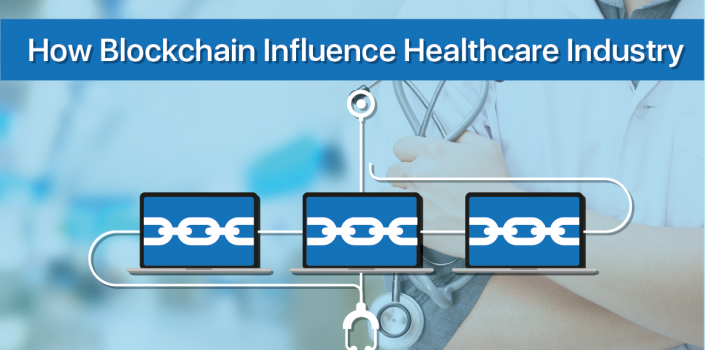"7 Mobile Application Testing Methods To Bring Out The Best App"
"What's New In Angular 6?"

In this digital age, it is imperative for industries to adopt and adapt the latest technologies in order to fulfill the growing demands of users. While this holds true for all industries, it is especially applicable to the healthcare sector too. And the blockchain revolution has made its way to the healthcare industry. So, how does blockchain influence the healthcare industry?
Everyone in the healthcare industry is in the quest of what’s possible with blockchain and how it could solve things in the future. Blockchain unlocks the true value of interoperability for the unclear exchange of information. And this is something that the entire healthcare ecosystem is in need of. In this article, we’re going to look how blockchain technology facilitates a clear exchange of information to help stakeholders to better-informed for interoperability.
Let's have a look at the blockchain influence in the healthcare industry.
Medical data management is a key advantage of Blockchain technology in the healthcare industry. With a Blockchain-based standard, every change to a patient’s record would be verified, all the changes on the record are added as a block to a larger blockchain. As a result, providers can assure that they have the complete medical history of a patient, including the information of how it has changed over time and who made these changes. This provides a comprehensive record, and ultimately, better treatment.
Blockchain Technology improves the electronic medical records management and allows secured access to patient’s records by any provider who needs it by saving cost, time and data tampering, and also the uncertainties, even the life-threatening issue of records being distributed across many different facilities and providers.
Through blockchain, you can achieve a longitudinal patient record with data collection, disease registries, lab results, treatment data that are gathered from inpatient, ambulatory and other connected devices. In simple blockchain assists providers in coming up with better ways of delivering care.
With Blockchain technology, all the existing challenges like uniformity, security, reliability, agility, quality, privacy, and even data interoperability are addressed and fixed. It gives timely access to data that healthcare providers can make use for crucial diagnosis to deliver appropriate treatments.
In fact, with blockchain technology, healthcare data becomes better managed, while cutting costs for patients as well as the providers.
With blockchain, it is now possible to offer realistic solutions by simplifying the complex medical billing process and minimizing fraudulent activities.
By automating the bill processing activities, blockchain eliminates the series of validations and multiple third-party intermediaries acting on behalf of other entities.
Greater auditability and traceability of blockchain technology increase trust in the processes. The claims can be automatically verified as there is no question of tampering since blockchain works on a validation-based approach. And there is no central authority, so there would be no compromise on Medicare errors fraud, theft, and larceny.
Blockchain assists healthcare industry in monitoring supply-demand cycles through its entire lifecycle- transaction validation, audit trail, fraud drop or any delays. This means the technology strengthens the track-and-trace capabilities by automating the process of identifying and authenticating manufacturers' GTIs (global trade item numbers) and device serial numbers.
When it comes to prescribing, blockchain provides a new level of data provenance for prescription medication to make sure they aren't altered or forged. Furthermore, blockchain help to build a proof of ownership of drug source at any point in the supply chain.
However, a blockchain based system keeps a chain-of-custody log, tracking every step of supply chain at the individual product level to eliminate counterfeit drugs.
Blockchain brings a solution to the healthcare security concern; the technology helps you to enjoy all the benefits of connected devices. In blockchain, no single party or platform is responsible for overall security of the records.
If you need to adjust any data, 51% of the network participants would need to approve that change and that changes will get reflected and updated in every copy. This enhances security and limits the risk of the malicious activity.
Blockchain technology in the healthcare sector will engage in better and more beneficial practices. The future looks bright, especially when it assures greater information exchange with guaranteed privacy protection and security. As blockchain gains traction, it will lead to more precise medical techniques and also bring about innovations in medical research. With a better handle on things, blockchain creates meaningful opportunities to bring distributed data management to the care continuum. However, in the immediate future, blockchain will address more issues around the healthcare industry and quickly make its way into the mainstream.